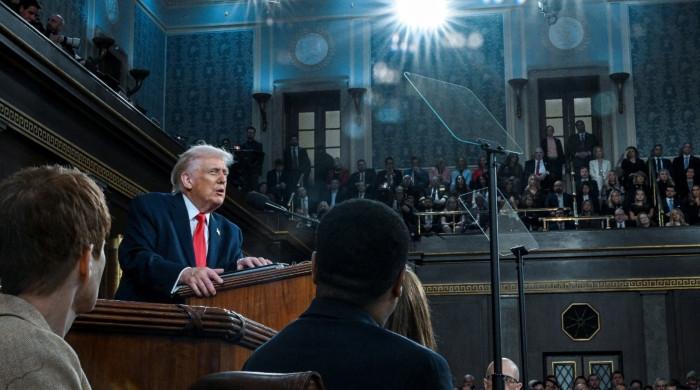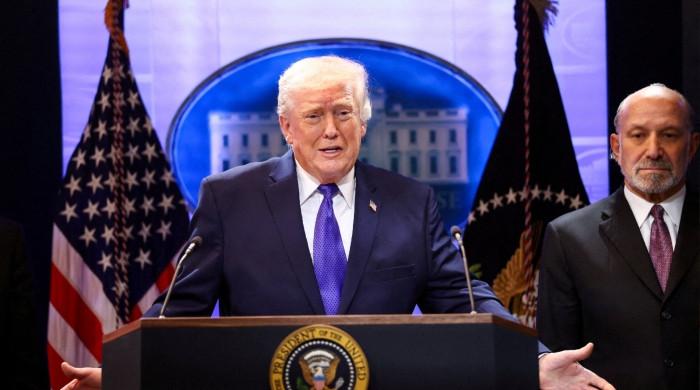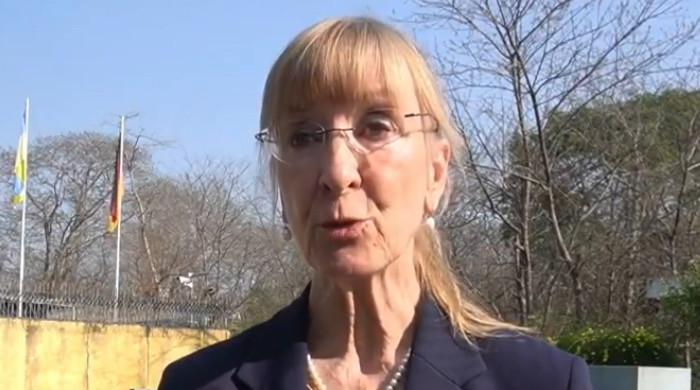Demonise coronavirus, not countries
This unprecedented outbreak is a wake-up call to join hands in finding a cure
March 11, 2020

Most of the modern world finds itself helpless in dealing with the novel coronavirus outbreak, with countries such as Italy and China under preventive lock-downs.
On the other hand, US President Donald Trump and UK Prime Minister Boris Johnson prepare to undergo tests after lawmakers who met them caught the disease.
This unprecedented outbreak is a wake-up call to join hands in finding a cure.
It is strange, however, that some right-wing politicians have chosen to exploit this worrisome situation, engaging in racism and labelling the coronavirus as "Wuhan virus" to demonise Asians. It is nothing but a distraction at best and perhaps more lethal than the virus itself.
Right-wing media, unsurprisingly, has become the mouthpiece of such racist politicians. It is very selectively using pictures of vulnerable groups, such as ethnic Asians and Africans, to portray them either as coronavirus-carriers or the ones who are hoarding stock.
This venomous trend is fuelling hatred and resulting into a spree of racist crimes through the US, UK, and Europe.
Over the past few weeks, xenophobic attacks have been reported even in California where an Asian-American student was beaten up in school. A similar incident happened earlier at a British university that lies in the heart of Bradford. A Singaporean student met a similar fate when a gang of young white men cornered him in the busy central London before punching and kicking him — that too in broad day light.
Racial hatred as exhibited through such attacks is a stark reminder of the notorious witch-hunt witnessed in early modern Europe.
These racially aggravated assaults are alarming, a clear reflection of how the next generation would most likely treat each other, and how the far-right politicians are successfully using ideologically-synchronised or short-sighted media to poison young minds.
While there is no denial that many countries are hardly equipped to cope with an outbreak of such a massive scale, is it really the fault of a nation or its citizens that they suffer from coronavirus? Needless to say but no one in Wuhan, Lombardi, Qom or Seattle surely wished to be infected by COVID-19.
Stigmatising the Chinese for eating any type of animal is reckless. For thousands of years, it has been their tradition to have all kinds of food as delicacies. It is also foolish to think that the ones who fell victim to the disease knowingly dined on the coronavirus-carrying animals.
Same goes for Italy — Europe’s hardest-hit and the world’s second-most affected country. Blaming Italians of irresponsible behaviour in containing the disease or spreading it elsewhere is absurd. The continent's hotspot has risked recession — but also set an example — by imposing a lock-down.
Even a developing country like Iran took unprecedented measures to fight the bug. It’s a land where religion plays significant role in people's daily lives, yet the authorities have called off Friday prayers in most cities, including Qom and Mashhad.
The traditional New Year activities are being cancelled to avoid ill-managed travelling and large gatherings.
While Iran is in a dire need of COVID-19 diagnostic kits, respirators, masks, and protective outfits, importing these medical supplies still poses a challenge as foreign companies fear retaliation from the US over the sanctions related to Tehran's nuclear works.
It’s like fighting a war without an armour.
Instead of providing support, exploiting this vulnerability to inflict more harm is nothing short of inhumane. Coronavirus should not be used as a weapon to deal blows upon blows to struggling economies or portraying their citizens as lower castes.
China should be lauded for dealing with more than 80,000 patients. Yes, it lost over 3,000 lives since the outbreak in Wuhan but it also managed to contain the millennium's deadliest virus in two months, which is itself an example to follow.
Italy, too, has seen over 600 deaths and is dealing with over 11,000 infections, whereas Iran has had almost 300 deaths and 8,000 of its citizens are currently under treatment.
Ironically, the developed world has failed to take care of its citizens.
Last week, almost half of the UK's coronavirus patients were sent home by hospitals as the National Health System (NHS) is so stretched out that quarantining 300 patients is off limits. One wonders why the British deputy health minister Nadine Dorries had to quarantine herself at home and not in a hospital? That too when she has an elderly mother living under the same roof!
It comes as no surprise when a UK hospital sent a coronavirus patient with obvious symptoms back, advising them to "avoid contact with others" pending further tests. As feared, however, the patient failed to heed the instructions and attended a big gathering, spreading the virus further.
Should Americans sue the Dartmouth-Hitchcock Medical Centre or an country — Italy — where a man had originally caught the virus? Going down this non-ending path will surely not serve the purpose.
At a time like this, a positive approach is needed.
In New York, where the outbreak was traced to a synagogue, Adina Garbuz — the spouse of New York coronavirus patient zero, Lawrence — wrote a remarkable letter to her staff. She, alongside her two kids and a neighbour, caught the coronavirus after her husband fell ill.
Without blaming anyone for the virus transmitted to her husband, Garbuz wrote: "When I first heard that Lawrence was positive, I immediately recognised there was going to be pandemonium all around us.
"Other than offering what I could to stop this from spreading further, all I care about is my family get better," she added.
Propaganda against China, Italy or Iran had worked until the virus was limited to a few countries; however, in less than three months, it has spread to almost 70% of countries around the world and almost all continents other than Antarctica are affected.
In a globalised world, blaming a few countries or ethnic minorities is sure to only stoke divisions. Isolating others will do more harm than good.
As US Senator Kamala Harris rightly said: "There is no excuse to discriminate against our neighbours. Xenophobia will not make our communities safer."











